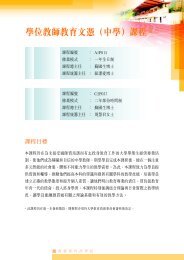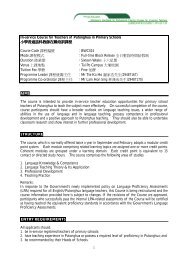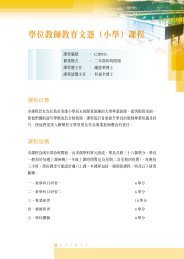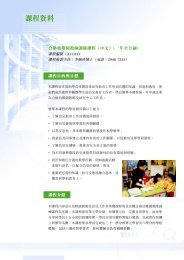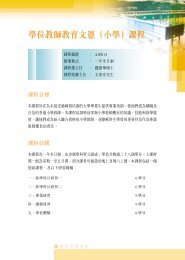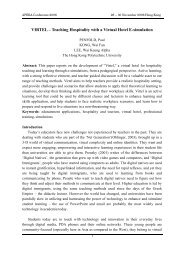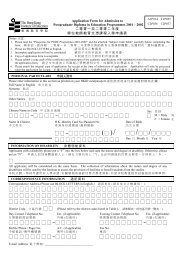The Structured Mentoring Programme
The Structured Mentoring Programme
The Structured Mentoring Programme
You also want an ePaper? Increase the reach of your titles
YUMPU automatically turns print PDFs into web optimized ePapers that Google loves.
APERA Conference 200628 – 30 November 2006 Hong KongSupporting the Beginning Teacher in Singapore Schools– <strong>The</strong> <strong>Structured</strong> <strong>Mentoring</strong> <strong>Programme</strong> (SMP)CHONG, SylviaNational Institute of Education, SingaporeTAN, Yit KeeMinistry of Education, SingaporeAbstract: Research indicates that professional preparation and development of teachers occursin stages that extend beyond their initial teacher preparation programme. <strong>The</strong> practice ofmentoring beginning teachers emerged in mid-1980s as a professional development strategy.Since then a broad base of studies agrees that beginning teachers need support and mentoringduring their transition into professional practice. Literature also suggests that a well-developedmentoring programme can contribute to the quality of teaching profession as well as retainingbeginning teachers in the service.One of the key recommendations of Singapore’s Ministry of Education Work Plan Seminar2005 is to develop our teachers and to provide them more time and space to build theircapabilities through development opportunities. For the beginning teachers this recommendationled to the introduction of a systemic framework for school-based mentoring, known as the<strong>Structured</strong> <strong>Mentoring</strong> <strong>Programme</strong> (SMP). <strong>The</strong> SMP aims to level up the standard of inductionand mentoring practices which currently varies across schools. <strong>The</strong> <strong>Structured</strong> <strong>Mentoring</strong><strong>Programme</strong> was launched 27 Jan 2006.This paper will be in two parts. <strong>The</strong> first part will discuss and focus on mentoring as astrategy for effectively inducting beginning teachers in Singapore schools. <strong>The</strong> second part willpresent the <strong>Structured</strong> <strong>Mentoring</strong> <strong>Programme</strong> (SMP) framework, and the mentoringrecommendations and practices designed to provide support for the beginning teacher.Concerns of a Beginning TeacherBeginning teachers have many concerns when they first enter the profession, regardless ofhow well prepared they are upon graduation. This professional phase is known as induction andis a transitional period in teacher education, between pre -service preparation and continuingprofessional development (Huling-Austin et al, 1989). This induction period spans the first threeto five years of a teacher’s career. During this period beginning teachers are unsure of theirskills in classroom management, planning, finding classroom resources, time management,working with coworkers, and dealing with parents (Eisenman & Thornton, 1999).Teachers go through three stages of concerns during their induction period (Gilles et al,2001). <strong>The</strong> first stage - the survival stage - beginning teachers struggle with personal andprofessional competence. <strong>The</strong>ir apprehensions include ineffective classroom management,student and peer acceptance and doubt of their teaching capabilities. In the next stage (mastery)beginning teachers’ concerns are more situational and include skill mastery, teaching methodsand classroom resources. <strong>The</strong> final stage (impact), the concerns shift fully to how they areaffecting their students. Gilles et al (2001) in their longitudinal study divided the categories. In1
APERA Conference 200628 – 30 November 2006 Hong Kongthe survival stage, beginning teachers reported concerns with personal and professional survival(33%), discipline and management (30%), school demands and organization (19%) dealing withparents (16%) and other miscellaneous concerns (1.3%). In the mastery category, 24% ofteachers were concerned with time management, 21% were concerned with helping the students,20% were concerned with various aspects of implementing the curriculum, and 10% wereconcerned with testing procedures, parental involvement, working with other teachers. In theimpact category, 73% of teachers were concerned with meeting their students’ needs and 8 %were concerned with motivating and connecting with students.Many beginning teachers are often given the same responsibility as veteran teachers withmany years of experience. Moreover, beginning teachers are often assigned the most challengingstudents with little or no support. It is also quite common for beginning teachers to be assigned toa subject area that they were not prepared in. In these cases the teachers “lack of pedagogicalcontent knowledge that is, the ability to conceptualize the subject matter as a series of learningevents or classroom activities for which a firm grasp of subject matter is a prerequisite”(Shulman, 1988). Many studies of beginning teachers assert that the first few years of teachingare stressful and difficult and fail to provide reflective and thoughtful teacher expertise (Darling-Hammond, 1988; Huling-Austin,1990)Jonson (2002) states that first year teachers share the following characteristics:• A beginning teacher’s job description is essentially the same as the teacher down the hallwho has five, ten or fifteen years of experience.• Because teachers often get the most difficult to teach students and other “hand-medowns”of the system: textbooks, desks, and schedules.• Teaching is something that has to be experienced in order to be clearly understood.Sitting in a student’s desk for 16 years does not give one a true picture of what teaching isreally like.• Student teaching experiences, in general, are not extensive enough to provide teacherswith the full breadth of experiences necessary to be a master teacher. (p32).Teacher <strong>Mentoring</strong>In recent years, educators have come to recognize the vital role played by “mentoring” inensuring that beginning teachers embark on a successful teaching career (David, 2000; Danielson,1999; Breeding & Whitworth, 1999). <strong>The</strong> National Commission on Teaching and America’sFuture (1996) recommends that the initial one to two years of teaching be designed like amedical residency programme, with a new teacher supported by a veteran teacher. According toLawson (1992), “<strong>The</strong> provision of experienced teachers as mentors for new teachers in someprograms has stemmed from recognition of the need for personal and social support in the school“(p.166). Huling-Austin et al (1989) suggest, “on-the-job nurture and support can acceleratesuccess and effectiveness as well as prevent some beginners from giving up and dropping out”(p.5).<strong>The</strong> term mentor has its origin in Homer’s poem “<strong>The</strong> Odyssey”. Before Odysseus goes towar, he entrusts an old and wise man named “Mentor” to educate and nurture his son. Thus theterm “mentoring”, which is defined as an emotional relationship between a more experiencedperson and less experienced in which the experienced helps the less experienced in his/her2
APERA Conference 200628 – 30 November 2006 Hong Konggrowth and development (Sikula, 2002). Kay (1990) helps define the meaning of mentor andsuggests, ‘<strong>Mentoring</strong> is comprehensive effort directed toward helping a protégé develop theattitudes and behaviors (skills) of self reliance and accountability within a defined environment”(p.27). Huling-Austin (1991) defines a mentor as a facilitator of change, a manager and initiator.New teachers need support. <strong>The</strong>y need ongoing professional development. <strong>The</strong>yneed a sense of belonging, of common cause, and the knowledge that over timethey will make a difference not only in the lives of individual children they teach,but in their profession. (Eisenman & Thornton, 1999. p. 2)As a primary instrument of teacher induction, mentoring programmes provide ongoingassistance to beginning teachers. <strong>Mentoring</strong> programmes designed to assist beginning teachersare usually designed with the objectives of improving both the professional as well as personaldevelopment of beginning teachers.<strong>The</strong>re are five general objectives of mentoring programmes (Mills, Moore & Keane, 2001;Odell, 1990). <strong>The</strong>y are:1. To provide continuing assistance to reduce the identified common problems of beginningteachers.2. To support the development of the knowledge and skills needed by beginners to besuccessful in their initial teaching position3. To integrate beginning teachers into the social system of the school, the school district,and community.4. To increase the positive attitudes of beginning teachers about teaching5. To increase the retention of good beginning teachers in the profession.Danielson (1999) describes the elements of a well-conceived mentoring programme:• <strong>The</strong> program should be more than a buddy system, in which the mentor isavailable as a sounding board and a sympathetic ear.• <strong>The</strong> program needs to provide more than practical guidance on school policiesand procedures.• <strong>The</strong> program must include more than generalized support.• <strong>The</strong> program should engage beginning teachers in self-assessment, reflection onpractice, and formative assessment.Huling-Austin et al. (1989) believe that mentoring programmes are based on three underlyinghypotheses. First, beginning teachers have a lot to learn about putting their content knowledgeand theory into practice within the classroom. Second, providing the beginning teachers withsupport wil enhance their effectiveness as teachers. Last, providing the support will help thebeginning teacher to improve at a quicker pace and will decrease the number of teachers leavingthe profession as a result of the many problems faced during induction. Huling-Austin (1990)defines mentoring programmes as structured programmes intended to provide some systematicand sustained assistance to beginning teachers for at least one year. This sustained assistance ofbeginning teachers should allow them to become comfortably acclimated and develop theirteaching skills.<strong>Mentoring</strong> also allows new and experienced teachers to put their collective knowledge baseinto action in a collaborative setting. Links between theory and practice are formed in a3
APERA Conference 200628 – 30 November 2006 Hong Kongreciprocal learning relationship between mentor and protégé (Weiss, 1999) and strong evidencesuggests that mentoring improves the practice of both as a long term outcome. While mentoringis by no means a substitute for a teacher lacking in content knowledge, it is “best suited tohelping new teachers translate their academic knowledge into meaningful instruction” (NEAFoundation for the Improvement of Education,1999.) Teacher <strong>Mentoring</strong> programs are nowperceived as an effective staff development approach for beginning teachers (Koki, 1997).<strong>Structured</strong> <strong>Mentoring</strong> <strong>Programme</strong>One of the key recommendations of Singapore’s Ministry of Education Work Plan Seminar2005 is to develop our teachers and to provide them more time and space to build theircapabilities through development opportunities. For the beginning teachers this recommendationled to the introduction of a systemic framework for school-based mentoring, known as the<strong>Structured</strong> <strong>Mentoring</strong> <strong>Programme</strong> (SMP). <strong>The</strong> SMP aims to level up the standard of inductionand mentoring practices which currently varies across schools. <strong>The</strong> <strong>Structured</strong> <strong>Mentoring</strong><strong>Programme</strong> was launched 27 Jan 2006.<strong>The</strong> initial teacher preparation programmes in National Institute of Education (NIE) providefoundational knowledge of subject matter as well as an understanding of the key concepts andprinciples of teaching and learning. Situated learning occurs during SMP where beginningteachers as “learners inevitably participate in communities of practitioners and that the masteryof knowledge and skill requires newcomers to move toward full participation in the socioculturalpractices of a community” (Lave & Wenger, 1991, p.29). Beginning teachers gain knowledgewithin a community of practice with the support of a more experienced peer.<strong>The</strong> first few years are also the all-too-familiar traumatic period for BTs as they are plungedinto a myriad of struggles, from learning to do lesson planning, coping with administrative duties,to dealing with parents and working well with colleagues. Statistics show that 20-30 percent ofnew teachers quit within the first three years as a result of the initial shock of entering theprofession (Brewster & Railsback, 2001). In Singapore, before SMP, organized and structuredinduction and mentoring programmes for BTs are exceptions rather than the rule. <strong>Mentoring</strong>,when available, is often ad hoc and informal. Few schools have well thought out, systematicmentoring programmes that reveal an appreciation of sound principles in terms of mentorselection, training and supporting of mentors, mentor-BT matching and programme evaluation(Ganser, 2002).To ensure that every BT is given the consistent support during the tough initial years, theSMP sought to establish mentoring of BTs in all schools as the norm. To support theimplementation of SMP in schools, a start-up package with practical and theoretical tips,administrative resources and consultancy is given to schools by Ministry of EducationHeadquarters (MOE HQ).<strong>The</strong> SMP Framework<strong>The</strong> SMP conceptual framework (figure 1) consists of three main dimensions: Induction,School-level <strong>Mentoring</strong> and BT Core Learning <strong>Programme</strong>s.4
APERA Conference 200628 – 30 November 2006 Hong KongBeginning Teacher DevelopmentInductionSchool-Level<strong>Mentoring</strong>BT Learning<strong>Programme</strong><strong>The</strong> <strong>Structured</strong> <strong>Mentoring</strong> <strong>Programme</strong>Figure 1InductionAlthough all schools in Singapore already have some existing form of Induction programmefor BTs, the SMP aimed to expand it by defining different levels where Induction could takeplace. In addition to Induction at School, Induction at MOE-HQ and Induction at Cluster arenow included as part of general induction for BTs.Induction at MOE-HQAn induction programme is organised by MOE for each intake of graduating BTs before they areposted to schools. During this session, experienced educators are invited to speak to BTs aboutthe purpose of teaching, contextualising it to education in the Singapore. BTs are also informedabout MOE vision, policies and personnel issues.Induction at ClusterSchools in Singapore are clustered in groups of 12-13 depending on their physical proximity andschool type. Headed by Superintendents, some clusters, conduct their own induction programmes.<strong>The</strong> benefits of cluster-based Induction include greater scope of activities, sharing of resources,improve administrative efficiency, and breaking of isolation (Hurworth).BT Learning <strong>Programme</strong>For the dimension on ‘BT Learning <strong>Programme</strong>’, the existing professional development forall BTs is enhanced under the SMP to include core components. <strong>The</strong>re are 5 core modules forBTs to complete during their first two years. <strong>The</strong>se modules are ‘Basic Counselling’, ‘RelatingWell with Parents’, ‘Reflective Practice’, ‘Classroom Management’ and ‘Assessment andQuestion Setting’.School Level <strong>Mentoring</strong><strong>The</strong> crux of the SMP, however, lies in the centre dimension on ‘School-Level <strong>Mentoring</strong>’.Effective mentoring is about establishing a learning conversation, building trusting relationshipsthat is based on learning agreement, and strives towards growing self-direction (NationalFramework for <strong>Mentoring</strong> and Coaching, UK, 2004-05). To achieve these, school leaders,mentors and BTs must understand the rationale for mentoring. <strong>The</strong>re are three rationales andpurposes for mentoring as stated in the SMP:5
APERA Conference 200628 – 30 November 2006 Hong Kong(i) <strong>Mentoring</strong> for Induction: This is the relationship building part of the mentoringjourney. Mentors bond with BTs through active participation and taking ownership of his BT’sinduction to the school community.(ii) <strong>Mentoring</strong> for Development: This is a form of specialist coaching in a structured,sustained manner to develop a specific area of the BT’s professional practice. Mentors supportBTs by clarifying learning goals and modelling expertise in practice. <strong>The</strong>y facilitate access toresearch, use open-ended questioning to prompt active reflection, and promote BT independencethrough confidence building.(iii) <strong>Mentoring</strong> for Growth: This aspect focuses on enabling BTs in their pursuit ofpersonal aspirations, vision and professional growth. Mentors provide guidance, feedback, andwhen necessary, direction to help BTs chart their action plan for professional development andcareer progression. Mentors are also information-givers who help BTs analyze issues andsituations from multiple perspectives so that thoughtful choices could be made. (NationalFramework for <strong>Mentoring</strong> and Coaching, UK, 2004-05)<strong>Mentoring</strong>, though at the outset serves to support BTs, also promotes the recognition anddevelopment of experienced teachers selected to be mentors. “Formalising the mentor role forexperienced teachers creates another niche in the career ladder for teachers and contributes to theprofessionalism of education.” (Koki, 1997) <strong>The</strong>re are three formalised mentor roles defined inthe SMP:(i) Mentor Coordinator: This is the leader and driver of the school’s mentoringprogramme, usually assumed by a Head of Department or a Senior Teacher. <strong>The</strong>y preparementors for their role by giving physical, social and emotional support, acting like mentors formentors. Mentor Coordinators perform the strategic role of staff developers responsible for thecareful planning of a mentoring programme that aims towards the attainment of institutionalgoals (Janas, 1996).(ii) Mentor: Experienced or Senior Teacher assigned to look after the well being, skillsdevelopment and professional growth of a BT. <strong>The</strong> good mentor is one who is committed tomentoring, skilled at providing instructional support, possesses good interpersonal skills,communicates hope and optimism, and is a model of continuous learning (Rowley, 1999).(iii) Mentor (Specialised): This role is like that of a specialist coach to a BT in specificareas of skills development. <strong>The</strong> Mentor (specialised) is a fellow professional with theknowledge and expertise relevant to the learning goal of the BT. For example, a BT needing helpin skills to run CCAs may be attached to a CCA HOD for specialised coaching.<strong>The</strong> roles described above can function together in various permutations, resulting indifferent mentoring structures in school. In general, these structures in schools may besummarised into two main models (figure 2):(i) One-to-one Model: This is a straightforward and commonly used model where a BT ispaired to a mentor based on his teaching subject, level or department. This model fosters deeperBT-mentor relationship as time is given for the friendship and trust to be built. This is arelationship driven model.(ii) Specialised Model: In this model, mentors work in teams so that their diversestrengths are tapped to mentor a group of BTs, each taking care of a different aspect of the BTs’learning needs. This is an efficiency driven model.6
APERA Conference 200628 – 30 November 2006 Hong KongMentor CoordinatorMentor A Mentor B Mentor C Mentor DBT 1 BT 2 BT 3 BT 4One-to-One ModelMentor CoordinatorMentor A Mentor B Mentor C(Teaching Subject+ ClassroomManagement)(Counselling)(TeachingSubject)BT 1 BT 2Specialised ModelFigure 2Conclusion<strong>The</strong> development and growth of beginning teachers through mentoring practices that promotetransactional and transformational learning provides an important foundation for theenhancement of professionalism in teaching. Successful mentoring programs require carefulplanning and management, commitment from multiple levels, and sufficient financial and nonfinancialresources. An evaluation of the SMP will be conducted later this year to look forimprovement trends. This evaluative process will be conducted regularly to provide a feedbackloop to “fine tune” and enhance the effectiveness of the SMP.ReferencesBreeding, M. & Whitworth, J. (1999). Increasing the success of first year teachers: A synthesisof three studies. Paper presented at the Annual Meeting of the American Association ofColleges for Teacher Education (Washington, DC, February 24-27).Brewster, C & Railsback, J (May 2001). Supporting Beginning Teachers: How Administrators,Teachers, and Policy Makers can help New Teachers Succeed. Northwest RegionalEducational LaboratoryDanielson, C. (1999). <strong>Mentoring</strong> beginning teachers: <strong>The</strong> case for mentoring. Teaching andChange, 6(3), 251–257.Darling-Hammond, Linda 1988 Policy and professionalism. Pp. 55–77 in A. Lieberman, ed.,Building a Professional Culture in Schools. New York: Teachers College Press.7
APERA Conference 200628 – 30 November 2006 Hong KongDavid, T. (2000). Programs in practice: Teacher mentoring - benefits all around. Kappa Delta PiRecord, 36(3), 134-136.Eisenman, G., & Thornton, H. (1999). Telementoring: Helping new teachers through the firstyear. <strong>The</strong> Journal, 26(9), 79-82.Ganser, T (2002). Supporting New Teacher Mentor Programs: Strategies for Principals. Paperpresented at the Annual Meeting of the International <strong>Mentoring</strong> Association (Fort Worth,TX)Gilles, C., Cramer, M., & Hwang, S. (2001). Beginning teacher perception: A longitudinal lookat teacher development. Action in Teacher Education, 13(3), 89-96.Huling-Austin, L. (1990). Teacher induction programs and internships. In W. R. Houston, R.Howsam, & J. Sikula (Eds.), Handbook of research on teacher education. New York:Macmillan, 535-548.Huling-Austin, L. (1991). Mentor Teachers: What Exactly Are <strong>The</strong>y Expected to Do?Centerpoint. <strong>The</strong> Texas Teacher Center Network. 1 (1), 7-21.Huling-Austin, L., Odell, S.J., Ishler, P., Kay, R.S. & Edelfelt, R.A. (1989). Assisting theBeginning Teacher. Reston, Va.: Association of Teacher Educators.Hurworth, R. Building and Sustaining Learning Communities: <strong>The</strong> Case of <strong>The</strong> University of theThird Age in Victoria. University of MelbourneJanas, M (1996) <strong>Mentoring</strong> the Mentor: A Challenge for Staff Development. Journal of StaffDevelopment, Fall 1996 (Vol 17, No. 4)Jonson, K. (2002). Being an effective mentor: How to help beginning teachers succeed.Thousand Oaks, CA: Corwin Press.Kay, R.S. (1990). <strong>Mentoring</strong>: Definition, Principles & Applications. In <strong>Mentoring</strong>: DevelopingSuccessful New Teachers. edited by Bey, T.M. & Holmes, C.T.. Reston, Va: Associationof Teacher EducatorsKoki, S. (1997) <strong>The</strong> Role of Teacher <strong>Mentoring</strong> in Educational Reform. PREL Briefing Paper,Pacific Resources for Education and Learning, Hawaii.Lave, J. & Wenger, E. (1991) Situated Learning. Legitimate peripheral participation,Cambridge: University of Cambridge Press.Lawson, H. A. (1992). Beyond the new conception of teacher induction. Journal of TeacherEducation, 43 (3), 163-172Martin, G (2006) <strong>The</strong> Art of <strong>Mentoring</strong>. Murdoch UniversityMills, H., Moore, D., & Keane, W.G. (2001). Addressing the teacher shortage: A study ofsuccessful mentoring program in Oakland County, Michigan. <strong>The</strong> Clearing House, 74(3):124-6.National Commission on Teaching and America’s Future (1996) What Matters Most: Teachingfor America’s FutureNational Foundation for the Improvement of Education (1999). Creating a Teacher <strong>Mentoring</strong>Program. Fall 1999, Vol 1National Framework for <strong>Mentoring</strong> and Coaching (2004-2005). Department for Education andSkills, UKOdell, S. (1990). Support for New Teachers. In <strong>Mentoring</strong>: Developing Successful NewTeachers. edited by Bey, T.M. & Holmes, C.T.. Reston, Va: Association of TeacherEducators8
APERA Conference 200628 – 30 November 2006 Hong KongRowley, J B (1999). <strong>The</strong> Good Mentor. Educational Leadership, Vol 56, No. 8, p20-22.Association for Supervision and Curriculum DevelopmentShulman, J. (1988). Look To a Colleague. Instructor. 97 (5), 32-34Sikula, J. (2002). A professional development model that works. Kappa Delta Pi Record, 40-42Tatto, M T (1998). <strong>The</strong> Influence of Teacher Education on Teachers’ Beliefs about the Purposesof Education, Roles and Practice. Journal of Teacher Education, Vol 49.Weiss, E M & Weiss, S G (Nov 1999). Beginning Teacher Induction, ERIC Digest, ED4364879



